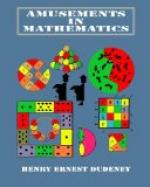32.—THE EXCURSION TICKET PUZZLE.
Nineteen shillings and ninepence may be paid in 458,908,622 different ways.
I do not propose to give my method of solution. Any such explanation would occupy an amount of space out of proportion to its interest or value. If I could give within reasonable limits a general solution for all money payments, I would strain a point to find room; but such a solution would be extremely complex and cumbersome, and I do not consider it worth the labour of working out.
Just to give an idea of what such a solution would involve, I will merely say that I find that, dealing only with those sums of money that are multiples of threepence, if we only use bronze coins any sum can be paid in (n + 1) squared ways where n always represents the number of pence. If threepenny-pieces are admitted, there are
2n cubed + 15n squared + 33n --------------------- + 1 ways. 18
If sixpences are also used there are
n^{4} + 22n cubed + 159n squared + 414n + 216
---------------------------------
216
ways, when the sum is a multiple of sixpence, and the constant, 216, changes to 324 when the money is not such a multiple. And so the formulas increase in complexity in an accelerating ratio as we go on to the other coins.
I will, however, add an interesting little table of the possible ways of changing our current coins which I believe has never been given in a book before. Change may be given for a
Farthing in 0 way. Halfpenny in 1 way. Penny in 3 ways. Threepenny-piece in 16 ways. Sixpence in 66 ways. Shilling in 402 ways. Florin in 3,818 ways. Half-crown in 8,709 ways. Double florin in 60,239 ways. Crown in 166,651 ways. Half-sovereign in 6,261,622 ways. Sovereign in 500,291,833 ways.
It is a little surprising to find that a sovereign may be changed in over five hundred million different ways. But I have no doubt as to the correctness of my figures.
33.—A PUZZLE IN REVERSALS.
(i) L13. (2) L23, 19s. 11d. The words “the number of pounds exceeds that of the pence” exclude such sums of money as L2, 16s. 2d. and all sums under L1.
34.—THE GROCER AND DRAPER.
The grocer was delayed half a minute and the draper eight minutes and a half (seventeen times as long as the grocer), making together nine minutes. Now, the grocer took twenty-four minutes to weigh out the sugar, and, with the half-minute delay, spent 24 min. 30 sec. over the task; but the draper had only to make forty-seven cuts to divide the roll of cloth, containing forty-eight yards, into yard pieces! This took him 15 min. 40 sec., and when we add the eight minutes and a half delay we get 24 min. 10 sec., from which it is clear that the draper won the race by twenty seconds. The majority of solvers make forty-eight cuts to divide the roll into forty-eight pieces!




